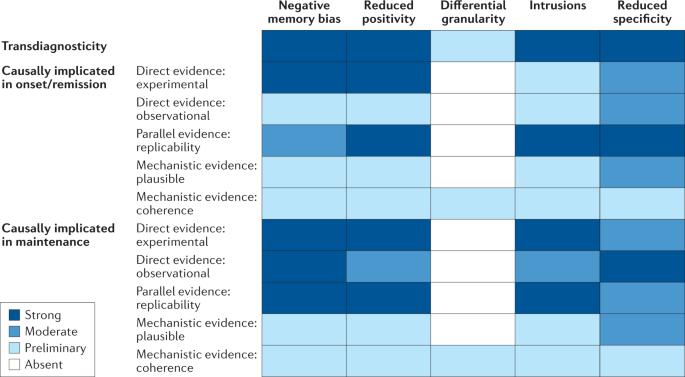Transdiagnostic distortions in autobiographical memory recollection
IF 16.8
Q1 PSYCHOLOGY, MULTIDISCIPLINARY
引用次数: 2
Abstract
Distortions in the recollection of autobiographical memories are a transdiagnostic feature of multiple mental health difficulties including mood, anxiety, stressor-related, eating and psychotic disorders. These distortions can be categorized into three broad domains: relatively increased accessibility, affective impact and degree of detail for memories of negatively valenced events with corollary reductions along these dimensions for positive memories; unwanted and distressing intrusive memories of salient past events such as traumas; and a marked relative difficulty in the voluntary retrieval of specific, emotive autobiographical episodes in favour of general themes aggregated across multiple episodes or across extended autobiographical periods. In this Review, we summarize basic science investigations that have carefully mapped the nature of these recollective distortions transdiagnostically across a range of syndromes, and elucidate their causal roles in the onset, maintenance and recovery from disorder. The amenability of these distortions to improvement through cognitive training has led to the translation of this basic science into a number of exciting memory-based interventions that target distortions to generate downstream improvements in clinical symptoms. We review and evaluate these interventions. Finally, we offer a theoretical framework that integrates the basic and clinical research across these three domains and suggest key future research directions. Distortions of autobiographical memory recollection characterize a variety of mental health disorders. In this Review, Dalgleish and Hitchcock summarize key basic research findings in three domains of autobiographical memory distortion, and describe how these have been leveraged in pre-clinical and clinical interventions.

自传体记忆回忆中的跨诊断扭曲
自传体记忆的忆述失真是包括情绪障碍、焦虑症、压力相关障碍、饮食障碍和精神障碍在内的多种心理健康障碍的一个跨诊断特征。这些失真可分为三大类:负面情感事件记忆的可及性、情感影响和细节程度相对增加,而正面记忆在这些方面的可及性、情感影响和细节程度则相应减少;对创伤等突出往事的不想要的、令人痛苦的侵入性记忆;以及在自愿检索具体的、情感性的自传情节方面存在明显的相对困难,而倾向于检索多个情节或多个较长自传时期的一般主题。在这篇综述中,我们总结了一些基础科学研究,这些研究仔细描绘了这些回忆性歪曲在一系列综合症中的跨诊断性质,并阐明了它们在障碍的发生、维持和恢复中的因果作用。通过认知训练可以改善这些畸变,这促使人们将这一基础科学转化为许多令人兴奋的基于记忆的干预措施,这些干预措施以畸变为目标,进而改善临床症状。我们将对这些干预措施进行回顾和评估。最后,我们提供了一个理论框架,该框架整合了这三个领域的基础和临床研究,并提出了未来的主要研究方向。自传体记忆回忆的扭曲是多种精神疾病的特征。在这篇综述中,Dalgleish 和 Hitchcock 总结了自传体记忆失真的三个领域的主要基础研究成果,并介绍了如何将这些成果应用于临床前和临床干预中。
本文章由计算机程序翻译,如有差异,请以英文原文为准。
求助全文
约1分钟内获得全文
求助全文

 求助内容:
求助内容: 应助结果提醒方式:
应助结果提醒方式:


